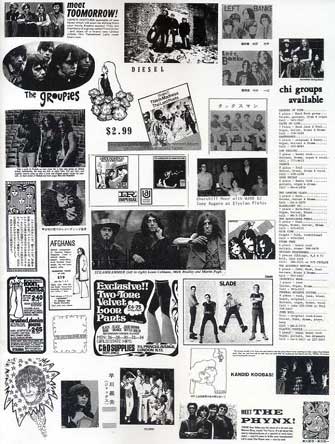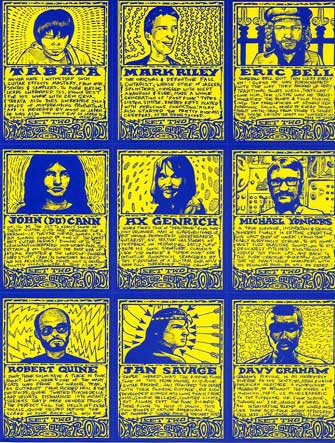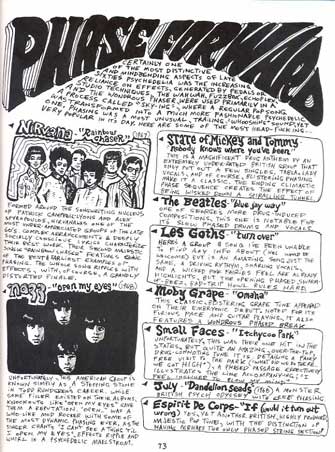The Psychedelic Bible
05.01.06
 If you are a student of Obscure Psychedelia, reading Galactic Zoo Dossier is like putting yourself through a Ph.D program. After combing the now, six issues, you will be able to name hundreds of underground Sixties bands, you’ll know who was in which band and what bands they switched to before either getting famous, retreating into solitude after too many LSD trips, or committing suicide. You’ll also learn what hippies wore, what kinds of comics they read, histories of the Psychedelic Music movements in every American city and in several countries, and you’ll get trading cards featuring the Gods of Psychedelic Rock, many of whom you’ve never heard of.
If you are a student of Obscure Psychedelia, reading Galactic Zoo Dossier is like putting yourself through a Ph.D program. After combing the now, six issues, you will be able to name hundreds of underground Sixties bands, you’ll know who was in which band and what bands they switched to before either getting famous, retreating into solitude after too many LSD trips, or committing suicide. You’ll also learn what hippies wore, what kinds of comics they read, histories of the Psychedelic Music movements in every American city and in several countries, and you’ll get trading cards featuring the Gods of Psychedelic Rock, many of whom you’ve never heard of.
 GZD, published by Drag City, is handwritten and hand-drawn by Chicago resident Steven Krakow, and there are, to my knowledge, only three things of his to order from Drag City: Issue #6 (the latest release) Issue #5, and the Galactic Zoo Dossier Compendium, which gathers all the early, out-of-print stuff together into one dense volume. Each zine comes with a CD compilation curated by Krakow. Issue #5’s disc was packed with New No-Wave, Noise, and Acid Rock, what Krakow apparently deems the New Psychedelic. Issue #6’s double-disc is fantastic, a mixture of old, lost classics with new Ben Chasny, Plastic Crimewave (Krakow’s band), and other young Psych-Rock worshippers. The big question to answer, first off, is, What kind of Psychedelic Music does Krakow specialize in? This is not for people into Peter, Paul, and Mary or Joan Baez. There are some references to Folk, like an article in Issue #6 about Why Cat Stevens Doesn’t Suck, which is stretching it because he totally sucks, but to amend that there’s an interview with Pentangle’s John Renbourn. However, GZD goes way beyond Syd Barrett and The Pretty Things’ “S.F. Sunday.” For the most part GZD features music like “Psychedelic Dandy,” “Mod Psych,” “Early Acid,” “Orgasmic Pop Innovation,” “Tribal Psychedelia,” “Vibrato Fuzz-Punk,” and “Thunderpunk,” mixed with articles about current bands like Acid Mothers Temple and Electric Wizard. After reading GZD the above-named types of Psych Rock will seem crystal clear to you.
GZD, published by Drag City, is handwritten and hand-drawn by Chicago resident Steven Krakow, and there are, to my knowledge, only three things of his to order from Drag City: Issue #6 (the latest release) Issue #5, and the Galactic Zoo Dossier Compendium, which gathers all the early, out-of-print stuff together into one dense volume. Each zine comes with a CD compilation curated by Krakow. Issue #5’s disc was packed with New No-Wave, Noise, and Acid Rock, what Krakow apparently deems the New Psychedelic. Issue #6’s double-disc is fantastic, a mixture of old, lost classics with new Ben Chasny, Plastic Crimewave (Krakow’s band), and other young Psych-Rock worshippers. The big question to answer, first off, is, What kind of Psychedelic Music does Krakow specialize in? This is not for people into Peter, Paul, and Mary or Joan Baez. There are some references to Folk, like an article in Issue #6 about Why Cat Stevens Doesn’t Suck, which is stretching it because he totally sucks, but to amend that there’s an interview with Pentangle’s John Renbourn. However, GZD goes way beyond Syd Barrett and The Pretty Things’ “S.F. Sunday.” For the most part GZD features music like “Psychedelic Dandy,” “Mod Psych,” “Early Acid,” “Orgasmic Pop Innovation,” “Tribal Psychedelia,” “Vibrato Fuzz-Punk,” and “Thunderpunk,” mixed with articles about current bands like Acid Mothers Temple and Electric Wizard. After reading GZD the above-named types of Psych Rock will seem crystal clear to you.
 I can’t think of anywhere else to learn about connections between Psych Rock and other underground music movements. Page 95 in the Compendium, for example, begins an enlightening article called “Punk Decadence,” about the bands Elmer Gantry’s Velvet Opera and Turquoise, which, with a succinct introduction, places them in music history thereby rescuing them from obscurity. Here’s the intro: “By 1966 and ’67 all the Mods and Dandies had given up drink and amphetamines for psychedelics, and replaced their matching suits and gang-fights with frilly shirts and flower power. Their drive and audacity would inspire punks for generations to come.” Most articles begin like this, giving the reader some sense of place in this vast muscial realm. One of my favorite pieces is about early Glam, featuring Alice Cooper Band and Ambrose Slade, showing the reader how closely linked Glam is to Psychedelia. And—What a dream!—to open a magazine to a spread about Tyrannosaurus Rex and The Move. Krakow’s casual, fanzine-ish writing style makes it easy for beginners to comprehend what’s happening, yet he talks with a level of expertise that is, at times, frightening. Does Krakow just tune in and drop out 24-hours a day?
I can’t think of anywhere else to learn about connections between Psych Rock and other underground music movements. Page 95 in the Compendium, for example, begins an enlightening article called “Punk Decadence,” about the bands Elmer Gantry’s Velvet Opera and Turquoise, which, with a succinct introduction, places them in music history thereby rescuing them from obscurity. Here’s the intro: “By 1966 and ’67 all the Mods and Dandies had given up drink and amphetamines for psychedelics, and replaced their matching suits and gang-fights with frilly shirts and flower power. Their drive and audacity would inspire punks for generations to come.” Most articles begin like this, giving the reader some sense of place in this vast muscial realm. One of my favorite pieces is about early Glam, featuring Alice Cooper Band and Ambrose Slade, showing the reader how closely linked Glam is to Psychedelia. And—What a dream!—to open a magazine to a spread about Tyrannosaurus Rex and The Move. Krakow’s casual, fanzine-ish writing style makes it easy for beginners to comprehend what’s happening, yet he talks with a level of expertise that is, at times, frightening. Does Krakow just tune in and drop out 24-hours a day?
 One unfortunate aspect of GZD is that after Krakow gets you “psyched” to hear all these bands, you have no way to get a hold of their records minus watching Ebay for the $90 vinyl to emerge from someone’s basement. Much of it is still way out-of-print. It goes to show that hunting the music down is part of the fun, though. Drag City have begun to re-issue some Psychedelic classics, like Gary Higgins’s Red Hash, but there are so many other albums I’m eager to hear, like Stackwaddy’s “Susie Q” (Heaviest U.K. Bar Sludge Ever), John Hudson’s “Forever Amber” (60s Pop Concept Album), and Gary Walker and The Rain. Maybe this stuff is available, who knows. These records are so obscure that it seems only fellow GZD readers would know where to hear them. Krakow should start some kind of trading group, so we can download each other’s scores. In the meantime, I’ll continue to hunt down GZD recommendations the slow way. Galactic Zoo Dossier is about the very best aspect of music collecting: that excitement of re-discovering some great rarity.
One unfortunate aspect of GZD is that after Krakow gets you “psyched” to hear all these bands, you have no way to get a hold of their records minus watching Ebay for the $90 vinyl to emerge from someone’s basement. Much of it is still way out-of-print. It goes to show that hunting the music down is part of the fun, though. Drag City have begun to re-issue some Psychedelic classics, like Gary Higgins’s Red Hash, but there are so many other albums I’m eager to hear, like Stackwaddy’s “Susie Q” (Heaviest U.K. Bar Sludge Ever), John Hudson’s “Forever Amber” (60s Pop Concept Album), and Gary Walker and The Rain. Maybe this stuff is available, who knows. These records are so obscure that it seems only fellow GZD readers would know where to hear them. Krakow should start some kind of trading group, so we can download each other’s scores. In the meantime, I’ll continue to hunt down GZD recommendations the slow way. Galactic Zoo Dossier is about the very best aspect of music collecting: that excitement of re-discovering some great rarity.